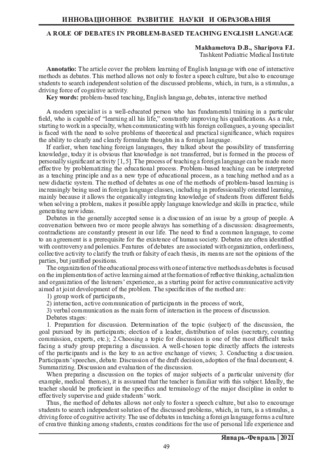
49
Январь-Февраль
2021
ИННОВАЦИОННОЕ РАЗВИТИЕ НАУКИ И ОБРАЗОВАНИЯ
A ROLE OF DEBATES IN PROBLEM-BASED TEACHING ENGLISH LANGUAGE
Makhametova D.B., Sharipova F.I.
Tashkent Pediatric Medical Institute
Annotatio:
The article cover the problem learning of English language with one of interactive
methods as debates. This method allows not only to foster a speech culture, but also to encourage
students to search independent solution of the discussed problems, which, in turn, is a stimulus, a
driving force of cognitive activity.
Key words:
problem-based teaching, English language, debates, interactive method
A modern specialist is a well-educated person who has fundamental training in a particular
field, who is capable of “learning all his life,” constantly improving his qualifications. As a rule,
starting to work in a specialty, when communicating with his foreign colleagues, a young specialist
is faced with the need to solve problems of theoretical and practical significance, which requires
the ability to clearly and clearly formulate thoughts in a foreign language.
If earlier, when teaching foreign languages, they talked about the possibility of transferring
knowledge, today it is obvious that knowledge is not transferred, but is formed in the process of
personally significant activity [1, 5]. The process of teaching a foreign language can be made more
effective by problematizing the educational process. Problem-based teaching can be interpreted
as a teaching principle and as a new type of educational process, as a teaching method and as a
new didactic system. The method of debates as one of the methods of problem-based learning is
increasingly being used in foreign language classes, including in professionally oriented learning,
mainly because it allows the organically integrating knowledge of students from different fields
when solving a problem, makes it possible apply language knowledge and skills in practice, while
generating new ideas.
Debates in the generally accepted sense is a discussion of an issue by a group of people. A
conversation between two or more people always has something of a discussion: disagreements,
contradictions are constantly present in our life. The need to find a common language, to come
to an agreement is a prerequisite for the existence of human society. Debates are often identified
with controversy and polemics. Features of debates are associated with organization, orderliness,
collective activity to clarify the truth or falsity of each thesis, its means are not the opinions of the
parties, but justified positions.
The organization of the educational process with one of interactive methods as debates is focused
on the implementation of active learning aimed at the formation of reflective thinking, actualization
and organization of the listeners’ experience, as a starting point for active communicative activity
aimed at joint development of the problem. The specificities of the method are:
1) group work of participants,
2) interaction, active communication of participants in the process of work,
3) verbal communication as the main form of interaction in the process of discussion.
Debates stages:
1. Preparation for discussion. Determination of the topic (subject) of the discussion, the
goal pursued by its participants; election of a leader, distribution of roles (secretary, counting
commission, experts, etc.); 2.Choosing a topic for discussion is one of the most difficult tasks
facing a study group preparing a discussion. A well-chosen topic directly affects the interests
of the participants and is the key to an active exchange of views; 3. Conducting a discussion.
Participants’ speeches, debate. Discussion of the draft decision, adoption of the final document; 4.
Summarizing. Discussion and evaluation of the discussion.
When preparing a discussion on the topics of major subjects of a particular university (for
example, medical themes), it is assumed that the teacher is familiar with this subject. Ideally, the
teacher should be proficient in the specifics and terminology of the major discipline in order to
effectively supervise and guide students’ work.
Thus, the method of debates allows not only to foster a speech culture, but also to encourage
students to search independent solution of the discussed problems, which, in turn, is a stimulus, a
driving force of cognitive activity. The use of debates in teaching a foreign language forms a culture
of creative thinking among students, creates conditions for the use of personal life experience and

50
Январь-Февраль
2021
ИННОВАЦИОННОЕ РАЗВИТИЕ НАУКИ И ОБРАЗОВАНИЯ
previously acquired knowledge to assimilate new ones.
References:
1.Махмутов М.И. Проблемное обучение. Основные вопросы теории. – М.: Педагогика,
1975. – 368 с.
2.https://www.researchgate.net/publication/298410885_The_use_of_in-class_debates_as_a_
teaching_strategy_in_increasing_students’_critical_thinking_and_collaborative_learning_skills_
in_higher_education






